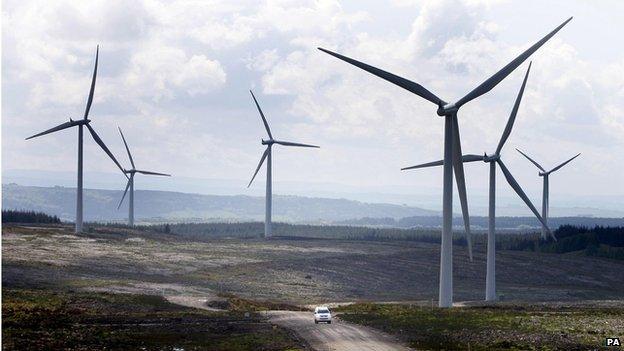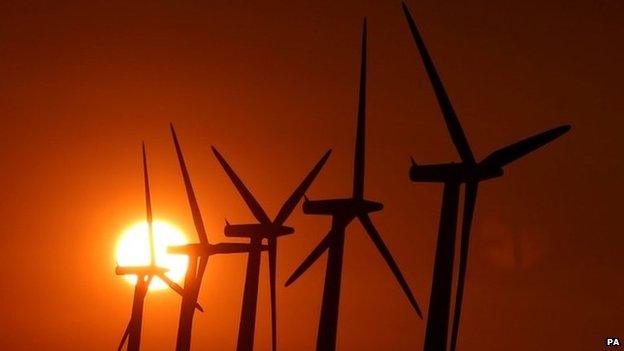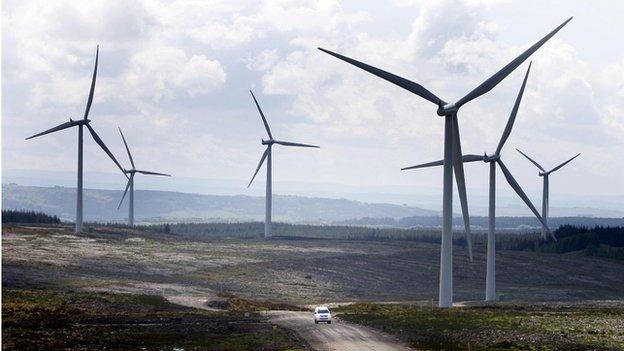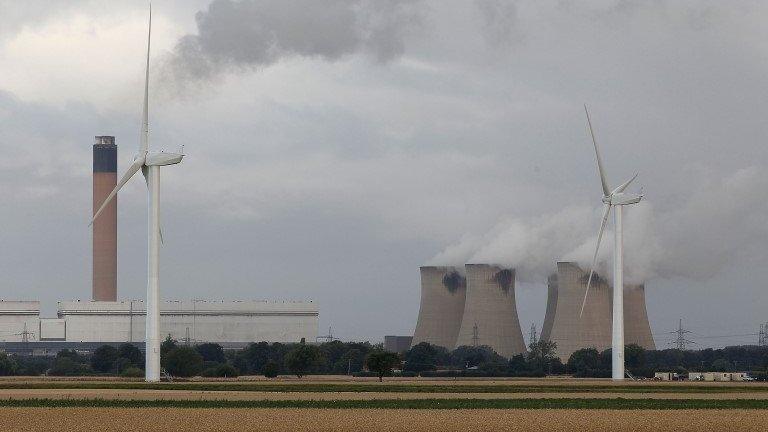End of wind farm subsidies 'could cost Scotland £3bn'
- Published
Around 70% of onshore wind projects in the UK planning system are in Scotland, as Laura Bicker reports
Scotland could lose £3bn in investment because of a UK government decision to exclude new onshore wind farms from a subsidy scheme a year earlier than planned, an industry body has said.
The subsidies will end from 1 April 2016 although there will be a grace period for projects which already have planning permission.
About 3,000 wind turbines across the UK are awaiting planning consent.
Scottish Renewables said the move was "neither fair nor reasonable".
Its chief executive Niall Stuart said it was "bad for jobs, bad for investment and can only hinder Scotland and the UK's efforts to meet binding climate change targets".
The money for the subsidy comes from the Renewables Obligation, which is funded by levies added to household fuel bills.
'Deeply regrettable'
First Minister Nicola Sturgeon said the decision was "wrong headed, perverse and downright outrageous."
During First Minister's Questions at Holyrood, she said: "I think it severely undermines any Tory claims to be pro-business."
She added: "This decision comes despite the UK energy secretary admitting on radio this very morning that onshore wind is one of the most cost-effective ways of developing renewable energy."
Ms Sturgeon argued that the move would also send out the wrong message ahead of a conference in Paris later this year aimed at getting a new global agreement on climate change.
The Scottish government believes the decision would have a disproportionate impact on Scotland, as about 70% of onshore wind projects in the UK planning system were in the country.

The move was part of a manifesto commitment by the Conservative Party ahead of the general election in May.
Energy and Climate Change Secretary Amber Rudd said: "We are driving forward our commitment to end new onshore wind subsidies and give local communities the final say over any new wind farms."
Scottish Conservative energy spokesman Murdo Fraser said the move was about the "Conservative government standing up for communities that the central belt SNP couldn't care less about."
He added: "The latest figures show that with all the wind projects already constructed, those under construction or given consent we have already met the SNPs 100% target for renewable electricity.
"What Scotland now urgently needs is a balanced energy policy with wind as part of the mix, but only one component rather than being the primary focus."
'Energy security'
But Mr Stuart, who represents more than 300 organisations in Scotland's renewables industry, said he believed the decision could put about two gigawatts of onshore wind projects in Scotland at risk.
He explained: "These are projects that could provide the equivalent electricity demand of 1.23 million Scottish homes and significantly improve our energy security, while bringing around £3bn of investment."
Mr Stuart added that a recent UK government report estimated that there were 5,400 jobs in the onshore wind sector in Scotland, and many of those could be at risk.
He pointed to a case where more than 100 future jobs would be under threat at an eco park development in rural Perthshire, as well as £10m of investment at the site.
Patrick Harvie, Scottish Green MSP and a member of Holyrood's economy and energy committee, said: "The Conservative government is far too willing to appease the irrational climate deniers on its backbenches, and this can be the only rationale for pulling the plug on the renewable energy industry.

"To do so while committing to decades of funding for nuclear energy, giving the green light to new fossil fuel extraction and dragging their feet on demand management shows that their energy policy is stuck in the 20th Century and failing to grasp the challenges and opportunities facing us today."
WWF Scotland director Lang Banks said the decision risked undermining the development of the cheapest form of renewables in the country, and was "bad news" for Scotland's clean energy ambitions.
Jeremy Sainsbury, director of Natural Power, a renewables consultancy which employs about 300 people, mainly in Scotland, said the firm has opportunities to deploy its workforce to projects overseas.
But he added: "It's not very healthy that Westminster has come out with this, which is clearly based on the views of some Tory MPs from middle England without really assessing the impact on investment in jobs in Scotland, or Wales for that matter, and without properly dealing with the implications in relation to the plans of those countries for delivery of their 2020 targets or their environmental commitments.
"The Scottish government has some quite challenging targets to meet and this is not going to help them meet it."
Graham Lang, chairman of Scotland Against Spin, a national alliance of groups and individuals which campaigns for reform of Scottish wind farm policy, said he was delighted the government was sticking to its promise to end the "ludicrously generous subsidies" for onshore wind farms.
The grace period could allow up to 5.2 gigawatts (GW) of wind capacity to go ahead, which could mean hundreds more wind turbines going up across the UK.
- Published18 June 2015

- Published24 April 2014
